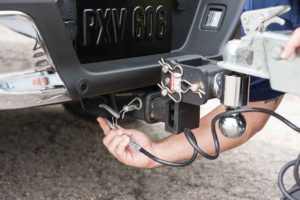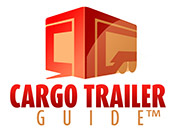Check Your Trailer Before Towing
No matter what hurry you may be in, take time to inspect your cargo trailer before you leave. Breakdowns on the road can not only be expensive, but can cause you or others serious injury or death.
Important! Make sure your trailer is fully attached to the tow vehicle before loading cargo.
Cargo trailer checklist:
- Check the coupler and make sure it is fully engaged and locked.
- Make sure the hitch and hitch ball are tight and does not wobble.
- Tongue jack should be fully retracted so that it will not hit the road if you hit a bump or hole.
- Electrical connection is fully inserted and cable has enough slack for turns but not too much that it drags on the road.
- Safety chains are connected and have enough slack for turns but not too much that they drag on the road. They should be crisscrossed and “S” hooks connected from underneath, not over the top of the holes.

- Emergency trailer brake lanyard is securely fasted to the tow vehicle, not the safety chains or any other part of the trailer connection. Make sure it has enough slack for turns but will not drag the road or snag on the tongue jack. You want it to be connected so that if the cargo trailer comes loose from your tow vehicle, it will pull the pin out of the brake switch that is mounted to the tongue or somewhere else on the front of your trailer.
- Check you wheel bearings. Remove the caps and ensure they are well packed with grease. Make sure no water appears or that the grease is not runny. If you find either of these issues, have new bearings and seals installed. Doing this now is much less costly than having a wheel come off your trailer while driving down the road which could cause serious injury or even death, not to mention complete destruction of your trailer.
- Check tires for any damage and that they are properly inflated. The proper amount of air pressure can be found on the tires.
- Make sure you have one spare tire for the trailer. Talk to your trailer dealer about getting a spare tire when you purchase your trailer.
- Make sure you have a jack to use in case of a flat tire on the trailer. Do not rely on the tow vehicle jack as they may not be usable on the trailer. Purchase an inexpensive floor jack and keep it in the trailer with your spare tire. Only one breakdown without a spare tire or the proper jack and you will never tow without having them again.
- Four way lug wrench is in the trailer. Do not try and use the standard “J” shaped automobile lug wrench.
- Make sure all lug nuts are tight.
- Check all the trailer and tow vehicle lights.
- License plate tag securely attached.
- Tag registration is in cab of tow vehicle.
- Check your cargo to make sure it is secured tightly and cannot move. Using straps that are too small can cause them to break during transit causing damage to your cargo and you may not even know it until it’s too late. In addition, loose cargo can shift weight causing you to lose control of your trailer.
- Make sure all doors are fully closed and locked.
- Do final walk around inspection of the trailer to make sure no screws are missing or loose that attach the outside sheeting or trim. Missing screws or exposed edges of the exterior skin or trim can fly off your trailer while towing it down the road, possibly hitting other vehicles and causing serious injury or even death.
- Check tow vehicle tires for proper inflation and/or damage. Towing a trailer puts stress on your engine. Make sure to check engine oil, belts, and all other fluids.
Be sure and read How to Couple and Uncouple your Cargo Trailer and Safe Cargo Trailer Towing.
Check with your trailer dealer for more information.
